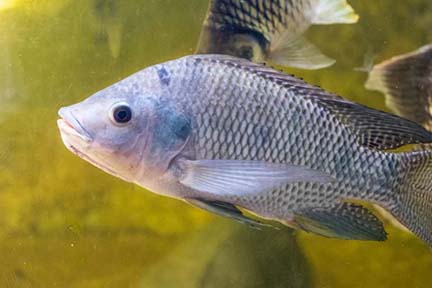
Third Consecutive Year of Decline in Opioid Overdose Deaths
|
|
|

|
|
|

Press Release FOR IMMEDIATE RELEASE: June 2, 2025 CONTACT: Lynn Sutfin, 517-241-2112, SutfinL1@michigan.gov Michigan releases 2025 Eat Safe Fish Guides to help LANSING, Mich. – The Michigan Department of Health and Human Services (MDHHS) has released the 2025 Eat Safe Fish Guides to help Michigan residents choose which fish are safe to eat for them and their families. The Eat Safe Fish Guides provide consumption guidelines for eating locally caught fish. Guidelines are based on levels of chemicals found in the portions of fish that people eat – typically the filets. Test results from the MDHHS Bureau of Laboratories are used to determine what is safe for people to eat over the long term. “There are many health benefits to eating fish and the Eat Safe Fish Guides provide consumption recommendations based on the levels of certain chemicals found in fish in waterbodies across the state,” said Dr. Natasha Bagdasarian, chief medical executive. “Michigan families can use these guidelines to help make healthy choices about the fish they eat.” MDHHS’ Eat Safe Fish Guides are not laws or regulations, but instead serve as a free resource for those who want information about which fish and how much of those fish are healthy to eat from various bodies of water across the state. A recent scientific review of perfluorooctane sulfonate (PFOS) has provided MDHHS more information about the toxicity of PFOS and its impact on human health. PFOS has been found to be a greater threat to human health than previously thought and has resulted in changes to this year’s Eat Safe Fish Guides. Additional guidelines are included due to PFOS for both entire waterbodies and specific fish species, including an increase in the number of Do Not Eat guidelines. MDHHS also produces the Buy Safe Fish Guide to help residents choose seafood that is lower in mercury from local grocery stores, fish markets and restaurants. The Eat Safe Fish Guides and Buy Safe Fish Guide are available online at Michigan.gov/EatSafeFish. For more information on how to buy, eat or prepare safe fish, or to get the 2025 Eat Safe Fish Guide for your region, visit Michigan.gov/EatSafeFish and select Find Your Area or call the MDHHS Division of Environmental Health at 800-648-6942. More information on the data that resulted in changes in PFOS guidelines is available in the PFOS Reference Dose Health Consultation. |

Written Wednesday March 12th at 4:50 PM

Region 8 at Rochester
ROCHESTER
ADAMS
STONEY CREEK
AVONDALE
BERKLEY
GROVES
SEAHOLM
ROYAL OAK
BLOOMFIELD HILLS
SOUTHFIELD ARTS AND TECH
OAK PARK
TROY
Detroit Renaissance
Detroit University-Detroit Jesuit (Boys only)
Birmingham Brother Rice (Boys only)
BOYS: This should be a really interesting regional. Adams should be the favorite because of balance but keep an eye on Oak Park, Groves, Birmingham Brother Rice, Detroit University-Detroit Jesuit. Troy is the wildcard and could be a team that could sneak up with their balance. This should be a fun regional.
GIRLS: Oak Park is loaded in the mid distance, hurdles, and sprints but Rochester could have a strong say with their balance and their dominance in the Red/White meet and it’s at their home track. Detroit Renaissance. Royal Oak, Troy, and Seaholm aren’t necessarily balanced but could be players in this meet. Overall the Knights are the favorite but the Falcons are right behind them.
Region 9 at Milford
Milford
CLARKSTON
LAKE ORION
OXFORD
FARMINGTON
NORTH FARMINGTON
WEST BLOOMFIELD
Novi Detroit Catholic Central (Boys only)
Holly
Lapeer
Walled Lake Central
Walled Lake Northern
Walled Lake Western
Waterford Kettering
Waterford Mott
Lakeland
Farmington Hills Mercy (Girls only)
BOYS: Walled Lake Central looks to be the favorite but keep and eye on West Bloomfield, Walled Lake Western, Clarkston, and Novi Detroit Catholic Central. They could do some damage in this regional. Overall this should be a really interesting regional.
GIRLS: This should be a really interesting regional. Lake Orion is the early favorite winning last season but keep an eye on Clarkston and Walled Lake Central, these are teams can score in bunches. Milford is the wildcard. Holly is coming off a Flint Metro League crown and could be a dark horse along with Farmington Hills Mercy.
Region 10 at Romeo
Romeo
TROY ATHENS
Chippewa Valley
Fraser
Macomb L’Anse Creuse
Macomb Dakota
New Baltimore Anchor Bay
Port Huron
Port Huron Northern
Sterling Heights
Sterling Heights Stevenson
Utica
Utica Eisenhower
Utica Ford II
BOYS: This should be a wide open regional. Chippewa Valley has the sprints, Macomb Dakota has the balance while several teams bring the field events. Overall this is anyone’s meet to take.
GIRLS: This should be a really interesting regional. Macomb Dakota is the early favorite with their depth but Troy Athens and Romeo might have says who could win this regional. This should be a three team regional between these three teams.
Region 18 at Birmingham Marian (Oakland)
Birmingham Marian (Girls only)
FERNDALE
FERNDALE UNIVERSITY
HARPER WOODS
Center Line
Detroit Country Day
Detroit Denby
Detroit Henry Ford
Eastpointe
Harper Woods Chandler Park
Hazel Park
Madison Heights Lamphere
St. Clair Shores South Lake
St. Clair Shores Lake Shore
Warren Fitzgerald
Warren Lincoln
Warren Regina (Girls only)
BOYS: Birmingham Detroit Country Day is loaded with proven experience. Ferndale could challenge although they don’t have a lot of balance. Overall this is the Yellow Jackets regional to lose.
GIRLS: Birmingham Detroit Country Day is loaded with proven experience. Ferndale and Madison Heights Lamphere could challenge but neither team has a lot of balance to challenge the Yellow Jackets. Overall this is the Yellow Jackets regional to lose.
Region 19 at North Branch
North Branch
PONTIAC
Armada
Bloomfield Hills Cranbrook-Kingswood
Croswell-Lexington
Goodrich
Imlay City
Macomb Lutheran North
Marysville
Orchard Lake St. Mary’s
Brandon
Pontiac Notre Dame Prep
Richmond
St. Clair
Yale
BOYS: This is a really interesting regional. Orchard Lake St. Marys is favored but Yale and Goodrich could have strong says. Marysville and North Branch are the wildcards. This is anyone’s regional to take.
GIRLS: This is a wide open regional. Yale, North Branch, Goodrich, Marysville, and Bloomfield Hills Cranbrook-Kingswood could score big in this regional. This regional like the boys is wide






|
|
||||
 |
||||
DNR News |
||||
|
||||
|
Following severe ice storms in northern Michigan, the Department of Natural Resources is assessing damage and conducting cleanup at several state parks, state park campgrounds, state forest campgrounds, boating access sites and state-managed trails. Find up-to-date information about closures, volunteer opportunities and more on the DNR storm recovery page. |